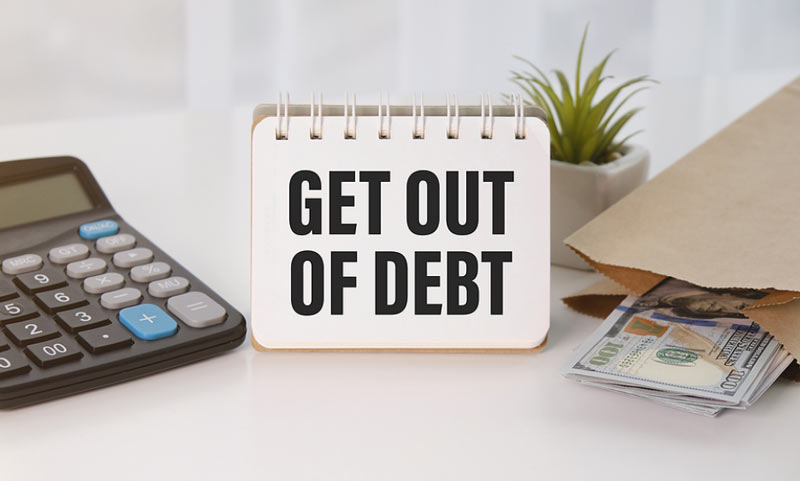Debt Settlement: Cheapest Way to Get Out of Debt?
Jul 30, 2023 By Kelly Walker
Are you overwhelmed with debt? Do you need help to keep up with your payments and make ends meet? If this is the case, debt settlement may be a good option for you. With debt settlement, you can negotiate directly with creditors or collection agencies on your behalf to reduce your outstanding debt.
This can significantly reduce how much money needs to be paid back and ultimately help alleviate your financial strain. In this article, we will discuss everything known about debt settlement – from why settling may be the right choice for certain individuals struggling financially to understanding how to approach initial creditors when attempting negotiation.
Defining Debt Settlement
Debt settlement is a process in which an individual enters into negotiations with creditors or collection agencies to reduce his/her existing outstanding debts. This could be done in different ways, like negotiating reduced payments, reducing the interest rate on your debt, or eliminating the remaining balance. Debt settlement can help you save thousands of dollars in most cases and should be considered easy to achieve.
Regarding debt settlement, it's important to remember that the creditor or collection agency wants their money back as soon as possible. As such, they are open to negotiation and have room for adjustments in repayment amounts and other agreements.
If you can prove financial hardship (through income statements, living expenses, etc.), you are more likely to succeed in your settlement. This is why it’s important to negotiate yourself and not go through a third-party debt relief company, as they will typically take a percentage of the savings.
The Basics of Debt Settlement
- You negotiate directly with creditors or collection agencies to reduce your debt
- Negotiations could include repayment arrangements, reduction of interest rates, and elimination of remaining balances
- Prove financial hardship to have the best chance for a successful settlement
- Please do not use a third-party debt relief company, as they will typically take a percentage of savings
The Cheapest Ways to Get Out of Debt For Debt Settlement
Contact Creditors
Speak directly to your creditors or collection agencies to discuss payment options and negotiate a reduced amount owed. Create a personalized budget plan or financial statement that outlines your income and living expenses. This will allow creditors to better understand your current financial situation and the ability to pay back some of what you owe.
Settlement Companies
Working with a debt settlement company could be beneficial if you find yourself too overwhelmed with debt. With their help, they can negotiate on your behalf for reduced payments and interest rates. They will typically do most of the work for you—including speaking directly with creditors and collection agencies—but will also take a percentage of any savings gained from settlements as payment for their services.
Debt Consolidation
Debt consolidation is another option that could help reduce your monthly payments. It involves taking all of your current debts and combining them into one loan with a lower interest rate and manageable repayment plan.
However, it’s important to note that debt consolidation doesn’t necessarily eliminate your debt but can instead assist in making it more manageable. Hence, this may not be your best option if you want to completely get out of debt.
Budgeting
Create a budget that will help you manage your money better in the future, and make sure you stick to it!
Refinance/Restructure Your Loans
Refinance or restructure existing loans to make them easier to manage and less expensive. Refinancing is taking out a new loan to pay off the old one, usually with better terms. Restructuring involves changing or extending the terms of your current loan, such as adjusting the interest rate or payment amount.
Refinancing and restructuring can help you save money in both the short- and long term by reducing your monthly payments and eliminating costly interest rates or fees. It can also consolidate multiple loans into one, making it easier to keep track of them each month.
Use Savings/Assets
Take advantage of savings or assets such as investments to pay down your debts.
Contact a Credit Counselor
Credit counselors can offer assistance in reducing debt and helping you develop a budget that works for you.
Recruit Help From Family/Friends
Enlist the help of family or friends to assist with repayment options. This could involve co-signing a loan, helping to pay off debt, or providing financial advice.
Asking family and friends for help can be uncomfortable and awkward, but you must be honest with them about your current situation. Explain to them the extent of your debt, how you have managed it up until now, and your proposed repayment plan. Providing them with details will make it easier for them to understand your situation and trust your ability to get back on track financially.
Debt Management Plan
Consider enrolling in a debt management plan (DMP) to reduce monthly payments and total owed.
Negotiate With Creditors
Negotiate directly with creditors to lower interest rates or extend loan payment terms. Creditors may be willing to work with you if you can prove financial hardship or demonstrate an inability to pay the debt in full. Before negotiations, check for applicable laws limiting creditors’ ability to collect on the debt.
Negotiating with creditors can be difficult, but there are steps you can take to increase your likelihood of success. Asking questions and gathering information about available options will help ensure that both sides reach a beneficial agreement for everyone involved.
Debt Settlement Program
Enroll in a debt settlement program that will negotiate with creditors on your behalf to reduce the amount of debt you owe.
Debt Settlement Strategies and Risks
Debt settlement is one of the most common strategies used by individuals to reduce debt. It’s important to understand the risks associated with this strategy, including potential negative impacts on your credit score and possible legal action creditors take if you fail to make payments as agreed upon during negotiations. Some debt relief companies may not provide the advertised services or charge excessive fees.
It’s also important to note that not all debts can be settled through negotiation. Certain types of debt, such as taxes or student loans, cannot be reduced through settlement and must be paid off in full. Ultimately, it’s essential to research any company you plan to work with before agreeing with them.
FAQs
Q: What are the advantages and disadvantages of settling debts?
A: One advantage of debt settlement is that it allows you to pay off debt more quickly than other solutions. Additionally, since the amount you pay is lower than the full balance due, it can help reduce your financial burden. However, there are also some disadvantages, such as potential negative impacts on credit scores or the possibility of getting sued by your creditors. It is important to weigh all of these factors before making a decision.
Q: How long does debt settlement take?
A: The time for debt settlement depends largely on how quickly negotiations can be completed and how much debt you owe. Depending on your situation, settling debts can take several months to several years. Additionally, remember that most debt settlements involve lump-sum payments rather than monthly installments, so it is important to have the funds available before starting negotiations.
Q: Is debt settlement a good option for me?
A: Ultimately, only you can make that decision. Debt settlement is an option for those who need help getting out of debt. Researching your options and speaking with a professional or financial advisor before deciding on debt settlement is important. The goal is to ultimately find the best solution to help you get out of debt in the most efficient way possible.
Conclusion
Debt settlement can be a great way to reduce debt and make it more manageable. From negotiating directly with creditors, working with settlement companies, consolidating loans, budgeting, or utilizing savings and assets, several options are available to help you find the best solution for your financial situation. Before taking any steps towards settling your debt, do thorough research on all of the available options and find the one that works best for you.









